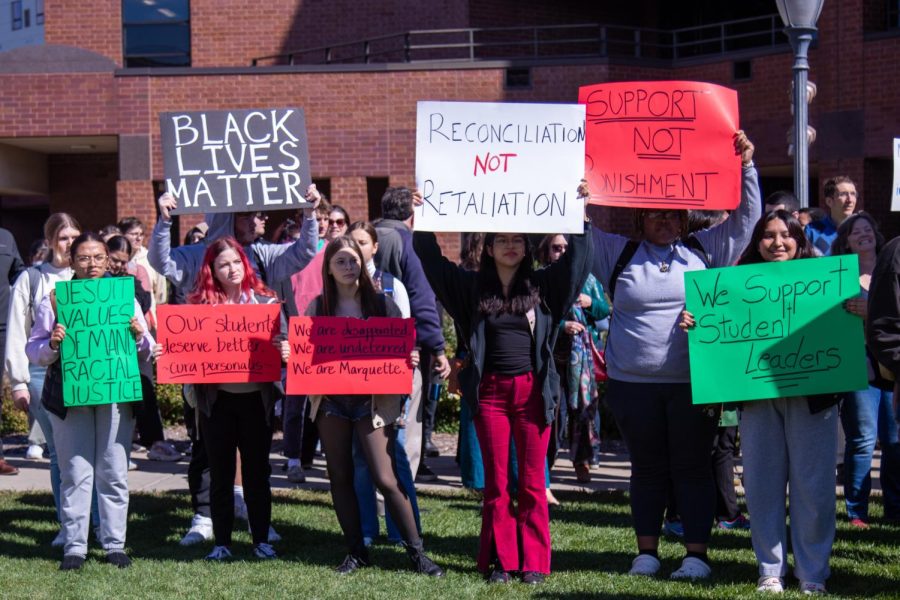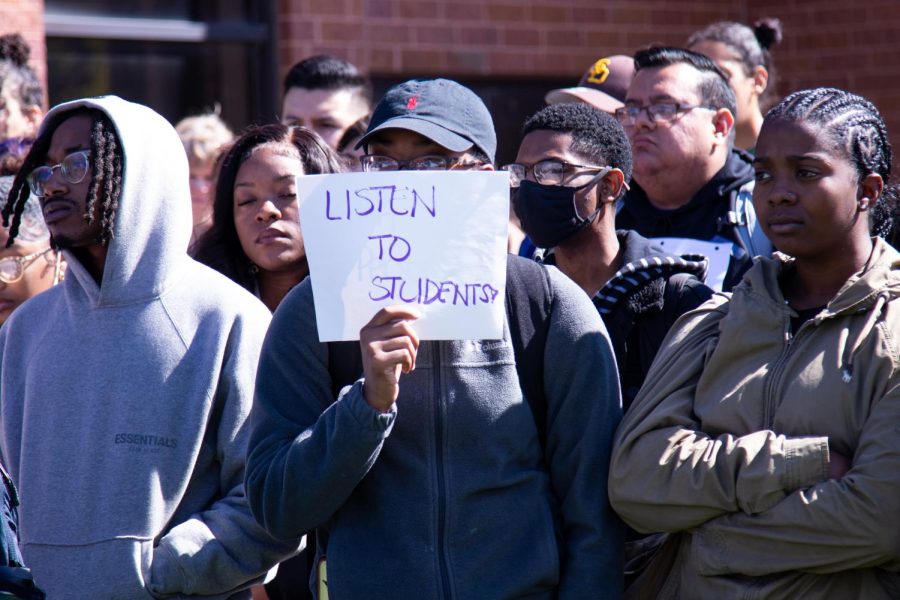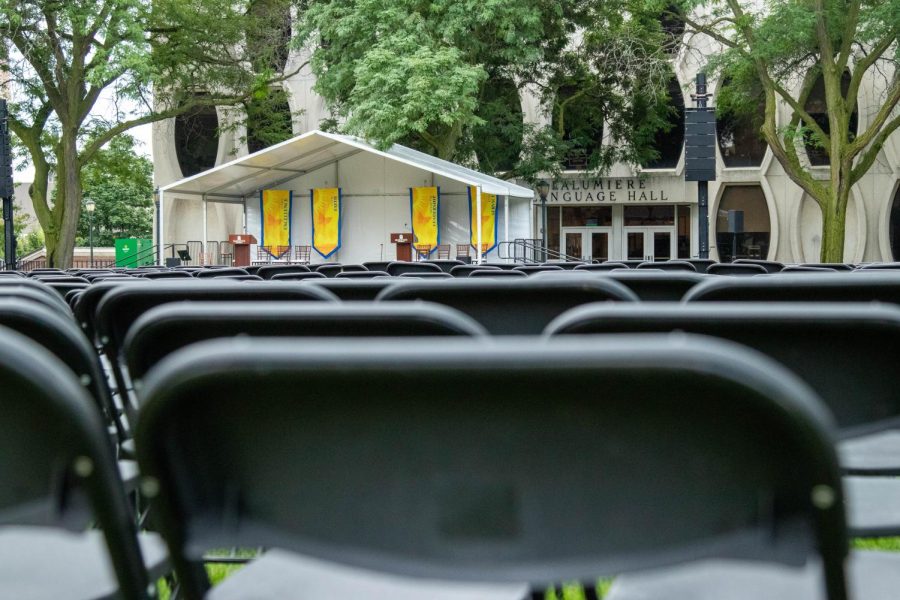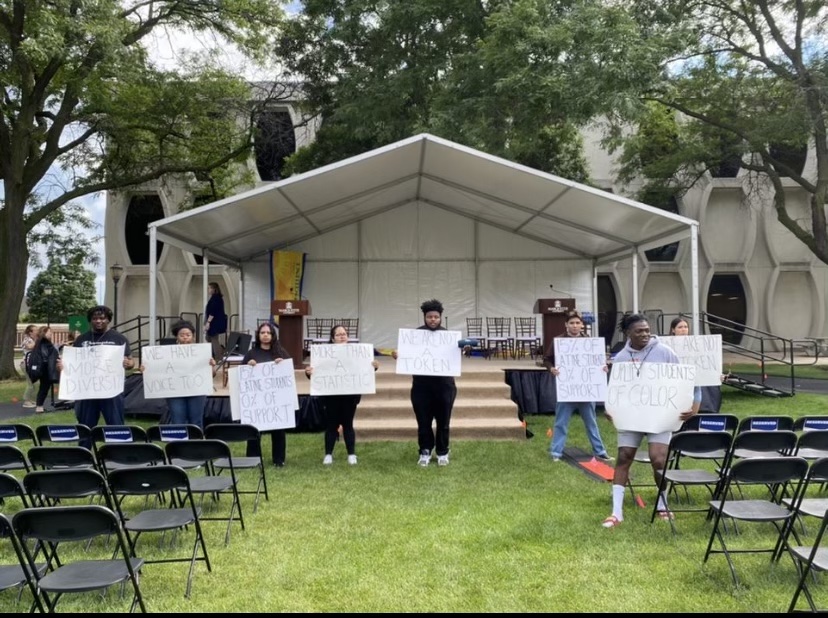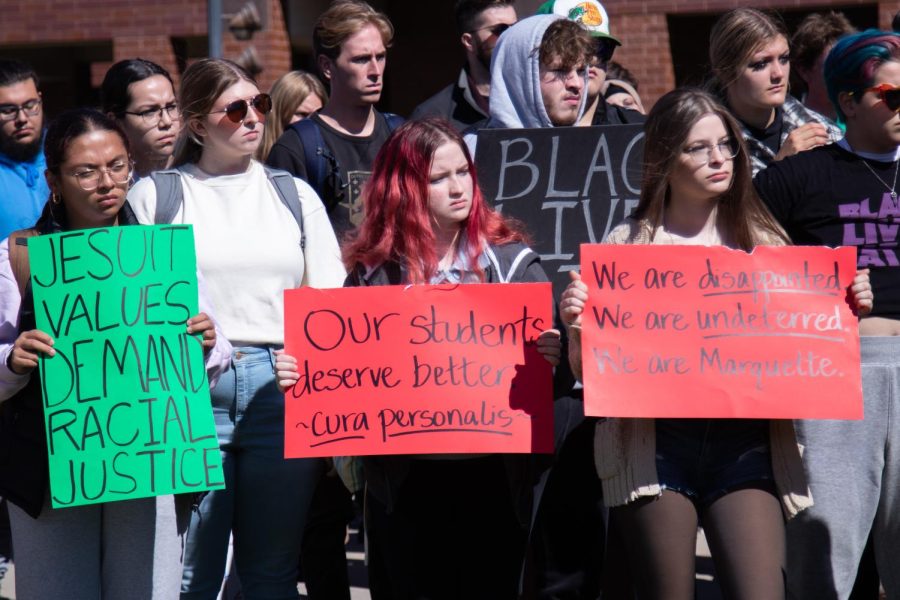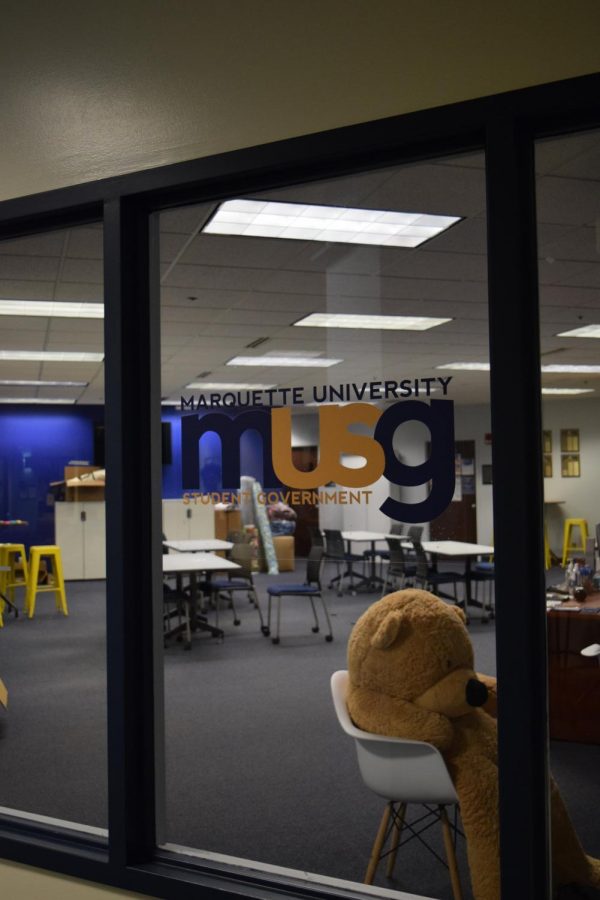A walk was held Sept. 28, at 11:50 a.m. to stand in solidarity with the students who were charged with student conduct violations. They were charged after conducting a demonstration at New Student Convocation Aug. 25.
The walk began outside of 1102 Wisconsin Ave towards the Alumni Memorial Union. They walked alongside the students accused of the violations until they turned in their hearing appeals at the end.
“We condemn these hearings and their outcome. We also stand in solidarity with amazing student leaders on campus demanding real action for racial justice on this campus, not mere words,” the Marquette Academic Workers Union posted in a tweet.
After the walk, there was a press release where faculty and staff members spoke out in support of the students who were charged.
Stephanie Rivera Berruz, associate professor of philosophy and co-director for the Center of Race, Ethnic and Indigenous Studies said she doesn’t believe the students’ penalties accurately reflect the student conduct process. She said that the university claims the process is supposed to create an “ethos of integrity and compassion” but in this case, it did not.
After the Black Lives Matter protest on campus in Fall 2020, University President Michael Lovell and Provost Kimo Ah Yun released a statement in response to the events stating that Marquette is committed to being an anti-racist institution.
Some of the goals the university said they were committed to included listening and answering with empathy when students discuss their experiences without being defensive, having staff go through anti-racist education, aiding their students in critically analyzing their own biases and behaviors and more.
The statement also said Marquette acknowledges the existence of systematic inequalities and noted that Marquette has participated and furthered these systems. The university then promised they would make changes to better students of color experiences on campus.
“And so we ask today, where is that change? Why have our students been forced to stage a demonstration — a demonstration that ended in their humiliation in order to spotlight the lack of resources on this campus?” Rivera Berruz said.
Nora Graham, a senior in the College of Arts & Sciences, said they are really frustrated with Marquette after they made all of these promises to students of color on campus.
“For them [the university] to turn around and not follow through with those [promises] is really frustrating, and I expect better from my school who has all of these values,” Graham said.
Rivera Berruz said although they aren’t denying that the students might have broken student conduct policies, they were there today to emphasize attention that the student’s actions were sensible since the university hasn’t made any changes to support the diverse student body.
Julissa Ventura, assistant professor in the College of Education, said these students work hard to pay tuition and to afford books. She also said that some work multiple jobs just to be able to live on campus.
“And this university dares to fine them with $300 which to them might not mean a lot, but to our students it might mean rent, it might mean food, right? It might mean your bills that care for you and your livelihood, so tell me how that is educational?” Ventura said.
There is currently a GoFundMe that was started by “Our Marquette” to help the students pay “unfair” fees.
A petition is also circulating Marquette’s campus created by the Instagram account @supportstudentsMU to appeal their disciplinary charges.
“These charges are punitive, not educational. Asking students — many on scholarships — to pay $300 for an event university administrators chose to cancel simply illustrates the students’ original point: Marquette is not listening to its students of color,” the petition reads.
The fundraiser has a goal of $3,200, and the money will go toward the 10 students who were charged.
Ventura also said faculty have tried to find a different and better path rather than going through the student conduct process.
“Yet we have been denied at every turn … The university leadership has said they will not change the student conduct process,” Ventura said.
Ventura said the students were traumatized by the way they were treated.
“They had to detail the racist incidents that they’ve experienced on this campus to justify why they were protesting in the first place, and basically they were told that your feelings are not going to be validated here,” Ventura said.
Not only were there students, faculty and staff present at the walk, but members from the Milwaukee community.
Deisy Espana, Milwaukee community member, said although she doesn’t go to Marquette, one of her friends is a student facing disciplinary action from the university.
“I don’t come to Marquette, and I don’t think that I would want to come to Marquette based on the events that have happened and the responses from the administration,” Espana said.
Similarly, Bailey Rutherford, a sophomore in the College of Arts & Sciences and member of the Black Student Council, said Marquette loves to talk about being an inclusive university that’s “super diverse,” when in reality she said she feels extremely isolated on campus.
“I don’t think I would be able to recommend this campus to another Black student because I wouldn’t want to facilitate their experience in college being terrible,” Rutherford said.
Provost Kimo Ah Yun wrote a statement in Marquette Today in attempt to address the concerns and information in regards to the student conduct process and demonstration at the convocation.
“Marquette senior leaders, starting with President Lovell and me, recognize the frustrations that have been expressed regarding our campus climate and seek to have ongoing conversations in the spirit of making our university better. It is clear we still have work ahead to foster greater inclusivity and belonging in our campus community,” Ah Yun said in the statement.
Ah Yun addressed “misinformation” in a question and answer section of the statement. One of those was in response to the student conduct process where he said that the university stands “firmly” behind the conduct process.
Ah Yun said the process has determined the outcomes for hundreds of cases every year and that the process is reviewed regularly.
The students were charged with suspension in abeyance and, although that isn’t in the student handbook, Ah Yun said in the statement this means that the suspension won’t take effect or appear on student’s transcripts as long as they do not violate any other university policies as well as finish all other consequences by their deadlines.
“Our students deserve better or we don’t deserve them,” Sergio González, assistant professor of history, said
This story is developing.
Timothy Littau, TJ Dysart and Andrew Amouzou contributed to this story.
This story was written by Julia Abuzzahab. She can be reached at julianna.abuzzahab@marquette.edu


